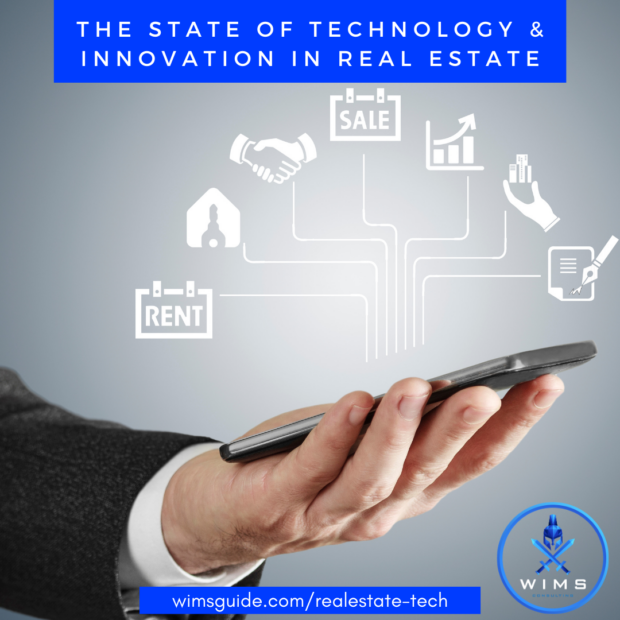The integration and adoption of technology into every industry is inevitable, even in industries that are traditionally relatively slower to adopt like real estate. Tech developments are enabling professionals in the space to be able to facilitate easier, faster, efficient, and more secure deals for all parties involved. Below are some of the emerging technology trends that are being integrated into real estate now, and in the coming years, many of which have been accelerated by the outbreak of COVID-19.
Augmented Reality & Virtual Reality
The AR/VR spaces have seen tremendous growth, and it seems with the onset of COVID-19 the demand and urgency to roll out these capabilities has only increased. With the need for limited contact during the pandemic, restricted travel, and work from home trends, it is only natural that AR/VR trends will continue to surface in the real estate industry.
AR/VR technology increases the efficiency of managing tangible spaces and properties. Buyers and investors can view homes, office spaces, apartment complexes, industrial properties, office buildings, etc. without having to physically visit these properties. This saves time and money. The benefits are plentiful and include:
- Virtual tours to advance remote property viewing,
- Increased efficiency of property marketing,
- Web and mobile applications for easy accessibility (even if a user does not have a headset),
- Detailed investigation of properties that saves time,
- Potential to remotely cover all stages of the negotiation process,
- More dynamic and real-time collaboration with architects, developers, GC’s, and brokers,
- Ability to build out a space, input secured tenants, and decorate a potential property, and
- Many other use cases and capabilities are being developed daily.
The increasing popularity of real estate mobile apps and websites to search for properties will only be enhanced by AR/VR technology. People are closing deals and investing in properties/land without even physically seeing properties and are saving time in eliminating those properties that they would otherwise waste view in person.
CRM, Automation, & Business Intelligence
CRM programs are still in an early stage of adoption in the real estate industry despite being around for a while, and regardless of having proven their incredible value to companies in every industry. This industry relies on, and has a heavy emphasis on relationships, so the value to having a great system is immense. In addition, the more a firm and its professionals can automate the sales and marketing process to supplement their activities, the more likely they will be to grow.
Further, not just helping with the management of relationships and sales but tracking and referencing data can really set firms apart as well. For example, “Business intelligence derived from big data is already one of the biggest trends in property management. It can empower a real estate application affecting the process of interaction of property owners, agents, and customers in the app. BI provides various tools for the optimization of decision-making. Business analysis algorithms are applied to get intelligent predictions defining the relationships of app users. Then, it is easier to give an answer to the question about what is going to happen. Reviewing internal data and analyzing business processes, BI is increasing your data-driven real estate business. With business intelligence software solutions, you can optimize your operations leveraging and processing all incoming data.”
Artificial Intelligence & Machine Learning
AI and ML have a bit longer of a way to go yet compared to the other trends, but they’re likely a lot close to widespread adoption then you’d think. An article from Forbes, highlighted some of their potential use cases:
“Right now, property search sites rely on simple preferences like location and size to display properties for sale; in the near future, however, AI may enable these sites to recommend properties based on additional preferences, personality traits, and values.
AI will also be able to help predict pricing trends more accurately. This type of technology would look at historical trends in the market for an area, but might also take into account area crime, schools, transportation, and marketplace activity.
It may also make the buying experience faster and easier. Companies are already creating ways to digitize the entire homebuying experience — no more reams of paper to read and sign at closing.”
Crowdfunding & Fund Syndication
Purchasing real estate, especially in the commercial/industrial sector, obviously requires a large amount of capital, which creates high barriers to entry. Syndication through crowdfunding, (along with blockchain mentioned below) allows for part-ownership in properties. Similar to how crowdfunding has become popular for those wanting to invest in start-ups without the traditionally large amounts invested by private investment firms and angel investors, you can now crowdfund to invest in properties too. This easier access enhances the trend towards a “sharing economy” where expenses are distributed, yet relationships flourish, through sharing the tangible things that traditionally single people or businesses would own. This is further evident in the business space through the popularity of coworking spaces.
Blockchain
Blockchain is most often associated with cryptocurrency, but it is reshaping business practices in traditionally non-tech industries. Blockchain does not necessarily change how real estate business is done; however, it serves to mitigate many of the challenges that arise in real estate negotiations, creating a safer and more efficient approach for the industry.
Fraud has existed in every industry that uses paper contracts. Why try to develop fraud detecting software or practices instead of just getting rid of the real problem: paper. So-called smart contracts can link digital property ownership to the blockchain, preventing any altering of material terms once they are encrypted. The documents become impossible to forge as the cryptography keeps them safe.
Although records are impossible to forge, they are not impossible to update. Typically, up-to-date, and relevant property information can be difficult to obtain when dealing with real estate paperwork. Also, it often must be paid for. Blockchain, however, provides all the historical data on properties and relevant updates in real time, preventing the need for any intermediaries to provide and verify relevant information.
Real estate deals involve many different individuals: notaries, bankers, real estate brokers, and others. Blockchain allows the buyer and seller to reduce the time needed from some of these respective individuals for their deals.
Drones
Marketing has become less about specific products/capabilities and more about storytelling, creating an emotional attachment to material things. Creating videos using drones can help tell the story of properties while maintaining a cost-effective marketing budget. Different angles give a better big picture look into what a property can offer.
Furthermore, drones can also assist in estimating the value of a property. Not only can you see surrounding properties, but you can get a better feel of the surrounding community. Drones can be used to spot potential risks or maintenance issues, providing a more thorough evaluation of properties.
Conclusion
This article just scratches the surface here, as there are many other technologies rolling out related to construction best practices, architecture, maintenance, materials, marketing, etc. The industry is ripe for further disruption and optimization which presents incredible opportunity for those that embrace it and make the most of these emerging technologies.
Written By: Mike Simmons and Evan Shirreffs.





